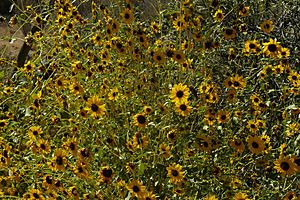Bolander's sunflower facts for kids
Quick facts for kids Bolander's sunflower |
|
|---|---|
 |
|
| Conservation status | |
| Scientific classification | |
| Genus: |
Helianthus
|
| Species: |
bolanderi
|
Helianthus bolanderi is a type of sunflower often called Bolander's sunflower or serpentine sunflower. It's a wild plant that grows naturally in California and Oregon in the United States. You can usually find it in mountainous areas. It especially likes to grow in a unique kind of soil called serpentine soil.
This sunflower has been found in southwestern Oregon and across northern and central California. It grows as far south as Santa Cruz County. There have also been a few reports of it in southern California, but these might be plants that were grown by people or escaped from gardens.
What Bolander's Sunflower Looks Like
Bolander's sunflower is a plant that grows tall and lives for only one year. It can reach over a meter (about 40 inches) in height. Its stem feels hairy and rough.
Leaves and Flowers
The leaves of this sunflower are usually shaped like a spear or an oval. They are often pointy and sometimes have jagged edges. They can be anywhere from 3 to 15 centimeters (about 1.2 to 6 inches) long.
The plant has one or more flower heads. Each plant can have many flower clusters growing all along its stem. Each flower head has a cup made of long, pointy special leaves called phyllaries.
Inside this cup, you'll see bright yellow petals, which are called ray florets. Each of these petal-like parts is about one to two centimeters (0.4 to 0.8 inches) long. In the very center of the flower head, there are many tiny flowers called disc florets. These can be yellow, dark purple, or reddish.
Seeds
After the flower blooms, it produces seeds. The seeds, called achenes, are small, only about 3 to 5 millimeters (0.12 to 0.20 inches) long.
See also
 In Spanish: Helianthus bolanderi para niños
In Spanish: Helianthus bolanderi para niños


